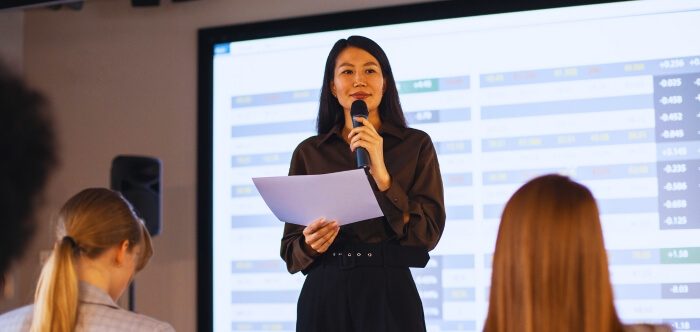Conference Moderator – Who is He and What Are His Tasks?
Who is the Conference Moderator?
A conference moderator is a person responsible for leading and coordinating discussions and presentations during an event. Their main goal is to ensure that the conference runs according to plan and that its participants actively participate in it. A moderator must be a communicative person with high personal culture, with the ability to manage time and conduct conversations in a way that engages participants and encourages interaction.
Conference Moderator Responsibilities

The role of a conference moderator is multi-faceted and includes a number of key tasks that are designed to ensure the smoothness and effectiveness of the entire event. The main moderation tasks include:
- Leading the Introduction and Welcome: The moderator usually starts the conference by introducing the agenda and welcoming the participants. Their job is to create the right atmosphere and introduce the conference topics, which helps set the right tone for the entire event.
- Time Control: An important task of the moderator is to ensure that each part of the conference runs according to the schedule. He is the one who makes sure that the speakers do not exceed their allotted time, which is crucial to maintaining the dynamics and fluidity of the event.
- Moderation of Discussions: The moderator directs panel discussions, ensuring that each speaker has an opportunity to speak and that the discussion is substantive and does not wander off topic. It is also his or her job to ask questions that can stimulate interesting debate and engage the audience in asking questions.
- Audience Interaction: Encouraging conference attendees to actively participate in the event is one of the key tasks of a moderator. This can include organizing Q&A sessions, encouraging voting in live polls, or initiating online discussions in the case of hybrid conferences.
- Managing Unexpected Situations: The moderator must be prepared for a variety of unexpected situations, such as technical problems, schedule delays, or difficult questions from the audience. It is important that he or she is able to react quickly and effectively, preventing disruption to the conference.
- Summary and Closing: At the end of the conference, the moderator often summarizes the most important conclusions from the discussion and thanks the participants and speakers for their participation. This is also the moment when he can encourage participation in the next editions of the event.
Why is the Role of the Moderator So Important?
The conference moderator acts as a bridge between the speakers and the audience. Their ability to manage time, moderate discussions, and engage participants is crucial to the success of the conference. A good moderator helps the event run smoothly and participants feel engaged and satisfied.
Choosing the right moderator can therefore determine the success or failure of a conference. They create the atmosphere of the event, take care of its dynamics and make each participant feel like an important part of the whole. Therefore, when organizing a conference, it is worth spending time finding a person who not only has the right qualifications, but is also able to meet the expectations of the organizers and participants.
Summary
A conference moderator is not only a person who runs the event, but also a key element that determines its quality and course. Their role is extremely important, which is why it is worth investing time and money in finding the right professional. A good moderator can not only efficiently manage the event, but also enrich its substantive value, engaging participants and creating an unforgettable experience.